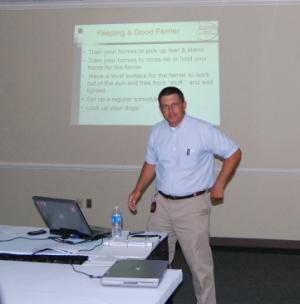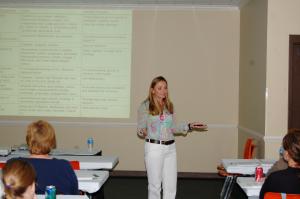By Tommy Brannon
The University Of Tennessee Agricultural Extension Service held a Masters Horse Owner seminar at the Agricenter in Memphis, TN July 7-9, 2011. Thirty-one horse owners participated in the classroom presentation and discussion led by seven equine experts. People came from as far away as Missouri, middle Tennessee, Mississippi, and North Alabama. Attendees received a reference notebook containing articles by sixteen contributing authors writing on Equine industry topics: horse health, nutrition, reproduction, genetics and selection, behavior and training, farm management, and equine business management.
The presenters for the class were:
Brian White, UT Extension Agent, Hardin County, TN. He covered horse farm management, including field and forage, pasture establishment and maintenance, bedding, manure disposal and fly control, barn, arena and fence design, construction and materials.
Dr. Stephen Galloway, DVM, Equine Dental Specialist at Animal Care Hospital, Oakland, TN. He presented in-depth information about vaccinations, communicable diseases and tests for them, as well as their consequences. He covered parasite control, including the new fecal egg count regimen and why the traditional method of administering de-wormer on a regular basis is producing alarmingly resistant strains of parasites. Dr. Galloway used slides and PowerPoint to demonstrate proper hoof care, including angle and balance, condition, texture, and proper shoeing. He also gave a demonstration on horse obesity, equine metabolic syndrome (similar to diabetes in humans), showing how to estimate the weight of a horse and explaining the equine body conditioning score. He gave pointers on how to fatten an underweight horse fattened up and for an overweight horse to lose weight safely. Dr. Galloway’s specialty in equine dentistry, so he gave a very detailed presentation, including visual aids, of horses’ teeth structure and photos of the consequences of improper dental care caused by some equine dental practitioners who are not veterinarians.
Dr. Colin Anderson, DVM Reproductive Specialist. He explained equine reproductive health, with emphases on artificial insemination. He asked the participants to give a lot of thought as to why they want to breed a particular horse, and to educate themselves about the process of gestation and foaling. He said that one does not know what kind of mother a maiden mare will be; thus a proven brood mare is the logical choice. He had on hand for inspection some of the tools used to freeze and ship semen. He debunked the practice of trying to produce a foal as close to January 1 as unnatural, since mares must have timed artificial light to come into season in the winter. He also emphasized good record keeping, knowing when a mare cycles, and keeping track of gestation to make sure they are off any Fescue hay or pasture 90 days before foaling to help prevent a miscarriage. Dr. Anderson showed pictures of the foaling process and foal care right after birth.
Dr. Bridgett McIntosh, Ph.D., UT Extension Horse Specialist, Nashville, TN. She gave an overall explanation of the horse industry, including statistics on the 9.2 million horses in the U.S. and the $102 billion impact on the economy.
Dr. McIntosh‘s expertise is equine nutrition. She explained the delicate horse digestive system and why is so important to know what to feed and what not feed; what is in the feed and forage; and the nutritional requirements of horses.
She also covered behavior and training, including anatomical reasons for certain horse behaviors; the senses of hearing, touch, taste, smell; and their field of vision including the horse’s blind spot. She explained the psychological reasons for some behaviors of a prey animal, like horses: “flight or fight.” the herding instinct, and pecking order.
Dr. Preston Buff, Ph.D., former Horse Specialist for Mississippi State University Extension, now with Nutro pet foods. His talk was on genetics using charts, graphs, and pictures of specific horse coloration as examples to demonstrate how complicated each recessive and dominate trait is. He said that you need to have a plan if you intend to breed; otherwise, you are just adding to the horse population.
Lynda M. Hill, Attorney Miller & Martin, PLLC, Nashville and Chattanooga, TN. Her informative talk was about the legal aspects of horse ownership and horse related business. She explained that 100 years ago it was assumed that everyone knew something about horses; not so today. We live in a very litigious society and we have to take measures to protect ourselves. She talked about liabilities when stabling, showing, and putting on horse events. She also explained some of the newer equine professional liability protection laws, and the fact that they have not been tested in court, as well as insurance and liability releases.
Becky Muller, UT Extension Agent, Shelby County, TN. Becky led a discussion on horse management safety, especially ground manners. Along with the topic of safety, there was quite a bit of discussion among the participants about helmets. Muller also covered trailering, including the selection of a tow vehicle, types of trailers and maintenance, driving techniques, and necessary insurance. She gave information about transporting horses in Tennessee and across state lines, specifically the health papers that are required.
There will be an advanced Horse Owners workshop held at the Agricenter Aug. 15-16 2011. The clinicians and agenda planned are;
Dr. Steven Galloway-demonstrate dental and the fecal egg count method of de-worming
Dr. Bridgett McIntosh-in depth nutrition talk and info on nutritional related diseases
Dr. Amy Plummer- lameness issues, hopefully ultrasound a horse
There will be horses on hand that fit the different body conditioning scores. To register for the class contact:
Becky Muller
Extension Agent II
UT Extension-Shelby County
7777 Walnut Grove Rd.
Suite B, Box 21
Memphis, TN 38120
901-752-1207
beckymuller@utk.edu
The University Of Tennessee Agricultural Extension Service held a Masters Horse Owner seminar at the Agricenter in Memphis, TN July 7-9, 2011. Thirty-one horse owners participated in the classroom presentation and discussion led by seven equine experts. People came from as far away as Missouri, middle Tennessee, Mississippi, and North Alabama. Attendees received a reference notebook containing articles by sixteen contributing authors writing on Equine industry topics: horse health, nutrition, reproduction, genetics and selection, behavior and training, farm management, and equine business management.
The presenters for the class were:
Brian White, UT Extension Agent, Hardin County, TN. He covered horse farm management, including field and forage, pasture establishment and maintenance, bedding, manure disposal and fly control, barn, arena and fence design, construction and materials.
Dr. Stephen Galloway, DVM, Equine Dental Specialist at Animal Care Hospital, Oakland, TN. He presented in-depth information about vaccinations, communicable diseases and tests for them, as well as their consequences. He covered parasite control, including the new fecal egg count regimen and why the traditional method of administering de-wormer on a regular basis is producing alarmingly resistant strains of parasites. Dr. Galloway used slides and PowerPoint to demonstrate proper hoof care, including angle and balance, condition, texture, and proper shoeing. He also gave a demonstration on horse obesity, equine metabolic syndrome (similar to diabetes in humans), showing how to estimate the weight of a horse and explaining the equine body conditioning score. He gave pointers on how to fatten an underweight horse fattened up and for an overweight horse to lose weight safely. Dr. Galloway’s specialty in equine dentistry, so he gave a very detailed presentation, including visual aids, of horses’ teeth structure and photos of the consequences of improper dental care caused by some equine dental practitioners who are not veterinarians.
Dr. Colin Anderson, DVM Reproductive Specialist. He explained equine reproductive health, with emphases on artificial insemination. He asked the participants to give a lot of thought as to why they want to breed a particular horse, and to educate themselves about the process of gestation and foaling. He said that one does not know what kind of mother a maiden mare will be; thus a proven brood mare is the logical choice. He had on hand for inspection some of the tools used to freeze and ship semen. He debunked the practice of trying to produce a foal as close to January 1 as unnatural, since mares must have timed artificial light to come into season in the winter. He also emphasized good record keeping, knowing when a mare cycles, and keeping track of gestation to make sure they are off any Fescue hay or pasture 90 days before foaling to help prevent a miscarriage. Dr. Anderson showed pictures of the foaling process and foal care right after birth.
Dr. Bridgett McIntosh, Ph.D., UT Extension Horse Specialist, Nashville, TN. She gave an overall explanation of the horse industry, including statistics on the 9.2 million horses in the U.S. and the $102 billion impact on the economy.
Dr. McIntosh‘s expertise is equine nutrition. She explained the delicate horse digestive system and why is so important to know what to feed and what not feed; what is in the feed and forage; and the nutritional requirements of horses.
She also covered behavior and training, including anatomical reasons for certain horse behaviors; the senses of hearing, touch, taste, smell; and their field of vision including the horse’s blind spot. She explained the psychological reasons for some behaviors of a prey animal, like horses: “flight or fight.” the herding instinct, and pecking order.
Dr. Preston Buff, Ph.D., former Horse Specialist for Mississippi State University Extension, now with Nutro pet foods. His talk was on genetics using charts, graphs, and pictures of specific horse coloration as examples to demonstrate how complicated each recessive and dominate trait is. He said that you need to have a plan if you intend to breed; otherwise, you are just adding to the horse population.
Lynda M. Hill, Attorney Miller & Martin, PLLC, Nashville and Chattanooga, TN. Her informative talk was about the legal aspects of horse ownership and horse related business. She explained that 100 years ago it was assumed that everyone knew something about horses; not so today. We live in a very litigious society and we have to take measures to protect ourselves. She talked about liabilities when stabling, showing, and putting on horse events. She also explained some of the newer equine professional liability protection laws, and the fact that they have not been tested in court, as well as insurance and liability releases.
Becky Muller, UT Extension Agent, Shelby County, TN. Becky led a discussion on horse management safety, especially ground manners. Along with the topic of safety, there was quite a bit of discussion among the participants about helmets. Muller also covered trailering, including the selection of a tow vehicle, types of trailers and maintenance, driving techniques, and necessary insurance. She gave information about transporting horses in Tennessee and across state lines, specifically the health papers that are required.
There will be an advanced Horse Owners workshop held at the Agricenter Aug. 15-16 2011. The clinicians and agenda planned are;
Dr. Steven Galloway-demonstrate dental and the fecal egg count method of de-worming
Dr. Bridgett McIntosh-in depth nutrition talk and info on nutritional related diseases
Dr. Amy Plummer- lameness issues, hopefully ultrasound a horse
There will be horses on hand that fit the different body conditioning scores. To register for the class contact:
Becky Muller
Extension Agent II
UT Extension-Shelby County
7777 Walnut Grove Rd.
Suite B, Box 21
Memphis, TN 38120
901-752-1207
beckymuller@utk.edu









